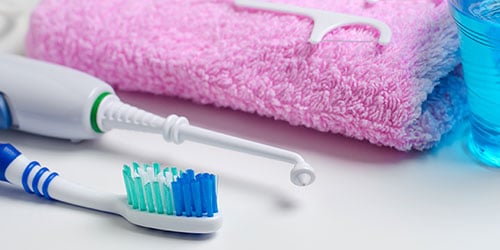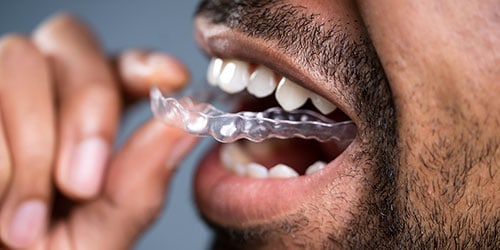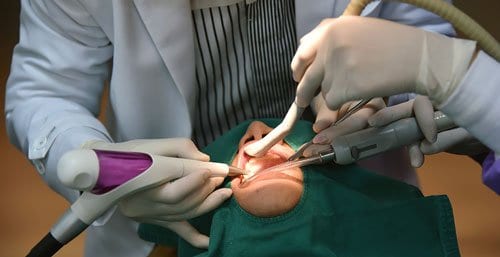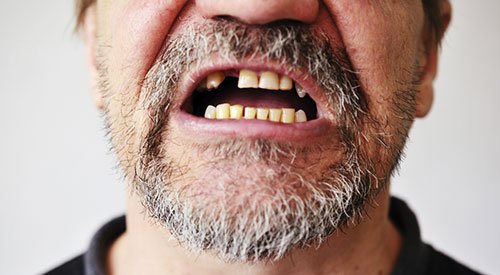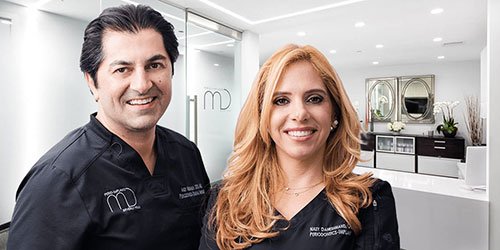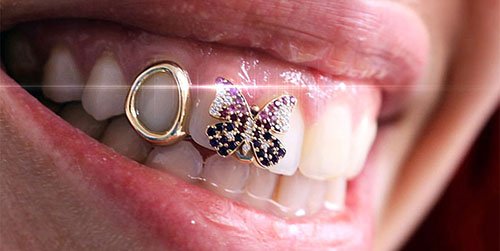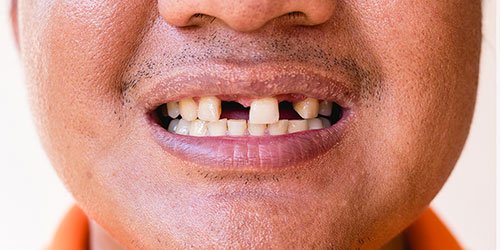
Have you lost one or more teeth? You might be surprised to know that’s not uncommon. About 60% of Americans aged 40-64 have lost at least one tooth. About one in ten Americans over 65 have lost all their teeth.
Missing teeth can cause problems with eating and talking, negatively impact self-esteem, and lead to bone loss in the jawbone.
What really matters to our patients is learning what can be done to replace missing teeth and regain a healthy, natural smile. Two popular options are dental implants and partial dentures. But how do you know which is right for you?
Dental Implant Versus Partial Dentures
Both are valid replacements for missing teeth and both have their own pros and cons (which we’ll go into in more detail later.) The right solution for you depends on price, preference, the health of your jawbone and remaining teeth, and even more factors.
Dentures and implants serve some of the same purposes. They:
- allow you to chew food
- support facial muscles
- improve speech
When you’re ready to talk about your options, schedule a free consultation with our team!
What are dental implants?

Humans have been using artificial teeth since 700 BCE. Options for tooth replacement used to include human or animal teeth or false teeth carved from ivory. Similar to dentures, these replacement teeth would sit above the gumline. Whereas natural teeth sit in the jawbone.
Nowadays we have two primary types of dental implant: ceramic and titanium. Modern dental implants involve a titanium or zirconia post inserted into the jaw. This post replaces the root of the missing tooth and fuses with the jawbone over three to six months (in a process known as “osseointegration.”) Once osseointegration is complete, a crown is attached to the post or abutment (connecting piece for titanium implants), and voila! You have a new tooth.
Am I a Candidate for an Implant?
Implant dentistry is a form of surgery. If you have a health issue that makes you ineligible for other surgical procedures, you probably won’t be eligible for dental implants.
Other disqualifying factors include:
- Smoking
- Clenching or grinding your teeth
- Significant bone loss in the jaw. A bone graft is an option, but there must be enough bone for the implant to fuse to.
- You have osteoporosis and are taking drugs to treat it
Pros and Cons of Dental Implants
Pros
Comfort
A 2019 study reported that implants and implant-supported dentures are more comfortable than conventional dentures.
Hygiene
Removable dentures require extra time to effectively clean. Maintaining implants is the same as maintaining your healthy, natural teeth.
Long-Lasting
If well cared for, a dental implant will last you a lifetime. The crown may need replacement if fractured or cracked, but the post will remain forever.
Cosmetics
Implants are almost indistinguishable from natural teeth.
Jawbone Support
A risk when missing even a single tooth is deterioration of the jawbone leading to the loss of adjacent teeth. Dental implants are set into the jawbone and (like a natural tooth root) reduce bone loss.
Cons
Maintenance
You need to continue brushing and flossing your implant as you would a natural tooth. Poor dental maintenance can result in peri-implantitis (a gum infection) and possible implant failure.
Requires Sufficient Bone Density
Because dental implants are inserted into the jawbone to replace the lost tooth root, they require sufficient bone for implantation. For many patients, lost bone density can be restored through bone grafts, but this will add extra healing time to the procedure.
Cost
Implants are generally more expensive than partial dentures. In addition, basic dental insurance probably won’t cover implants.
For some, the cost of dental implants can be offputting. However, if an implant is what’s best for you, we’re happy to discuss financing options.
Wait Time
As previously mentioned, if you need a bone graft before your implant procedure, there are months of waiting. Then, you’ll wait three to six months for the implant post to fuse with the jawbone before your permanent crown can be attached.
What is A Partial Denture?

Partial dentures are removable prostheses used to replace missing teeth, similarly to full dentures. However, partial dentures may replace one or multiple lost teeth rather than a full mouth.
Removable partial dentures consist of a gum-colored plastic base with attached replacement teeth. The plastic base is connected to a metal framework that attaches the partial denture to the adjacent teeth.
Partial dentures can be made permanent by placing crowns on the adjacent teeth and attaching the metal framework to them. Known as “dental bridges,” this option provides more stability but does permanently alter the teeth on which the crowns are placed.
Pros and Cons of Partial Dentures
Pros
Non-Invasive
Dentures are not secured to the jawbone, so you can be fitted for dentures regardless of how much bone is present. Furthermore, no surgery is required.
Cost
Partial dentures and bridges are generally considered a more affordable option. They can be thousands of dollars cheaper than implants. Plus, insurance will generally cover dentures (at least partially).
Less Recovery Time
Because partial dentures don’t require surgery, they can be placed quickly and with no recovery time. Even if you have crowns fitted for a permanent denture, the recovery time is only a few days for most patients.
Cons
Instability
Dentures rely on adjacent teeth and denture adhesives to keep them locked in place. Unfortunately, this does leave potential for slipping and rubbing.
Cosmetics
Partial dentures are made to look like natural teeth. However, the clasp holding them in place may show when talking or eating. In addition, a partial denture that’s slid slightly out of place won’t necessarily be indistinguishable from natural teeth.
Oral Health
Bacteria can accumulate around a partial denture and contribute to tooth decay and gum disease. Partials also require special cleaning and care.
Tooth Damage
Partial dentures rely on adjacent teeth for support. Unfortunately, partials can cause damage to the healthy teeth around them.
For fixed bridges, healthy teeth must be filed down to apply crowns to support the bridge. While minimal, this does permanently damage the neighboring teeth.
Require Replacing
With proper maintenance, partial dentures can last 6-8 years. Which is a long time! But implants, with proper care, can last a lifetime.
So, what’s the best missing tooth replacement option?
Dental implants are becoming much more popular among patients and implant specialists. And for good reason!
While the average cost is higher than partial dentures, they can last a lifetime with proper care. Plus, the support implants give to the jawbone can help prevent further tooth loss!
However, not everyone wants dental implants and some patients don’t want the accompanying surgery. At MD Periodontics, your happiness and dental health are our top priority. During your consultation, we’ll discuss your specific needs and medical history and work with you to determine the best treatment plan.
Why choose MD Periodontics for Dental Implants in Beverly Hills?
MD Periodontics in Beverly Hills has become a worldwide destination for patients seeking dental implants. Dr. Moshrefi and Dr. Daneshmand, both board-certified periodontists, have a deep understanding of gum and jaw structure. They have received special training in implant procedures and have completed more than 1,000 implant procedures – and experience matters.
MD Periodontics is Beverly Hills’ premiere facility for dental implants. Our periodontists’ care and expertise attract clients not just from the Los Angeles area, but around the globe. A consultation with either Dr. Moshrefi or Dr. Daneshmand is the first step on your journey to a healthy solution to tooth restoration, and a smile you can happily share.
To schedule a consultation, click here or call us at (855) 245-1100.
At MD Periodontics, we take our patients’ safety seriously. Our facility’s Covid-19 patient safety procedures exceed all CDC recommendations. Masks are required in our institutes at all times.
We are conveniently located to patients throughout Southern California and the Los Angeles area. Our Beverly Hills office is conveniently located near West Los Angeles, Culver City, West Hollywood, Downtown Los Angeles, Marina del Rey, Pacific Palisades, Malibu, Manhattan Beach, Sherman Oaks, and Encino.
- The Power of MD Perio’s 3D Dental Scanner Workflow - April 15, 2024
- Valuable Insights from Dentists: What Dentists Wish You Knew! - June 30, 2023
- Manual vs Power Toothbrushes: Is One Really Better? - September 15, 2022
 (855) 245-1100
(855) 245-1100 Which is Better, Dentures or Dental Implants?
Which is Better, Dentures or Dental Implants?















